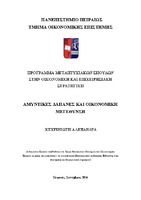Αμυντικές δαπάνες και οικονομική μεγέθυνση
Military expenditures and economic growth

View/
Keywords
Αμυντική βιομηχανία ; Αμυντικές δαπάνες ; Οικονομική μεγέθυνση ; Δεδομένα πάνελ ; Military expenditures ; Economic growth ; Panel dataAbstract
The relationship between military expenditures and economic growth has received
considerable attention from both scholars and policy-makers over the past few
decades. Despite the existing arguments that suggest that defence spending either
improves or forces down a country’s economic growth, empirical evidence in clear
support of such arguments is far from conclusive. This is also the case regarding the
existence of a long-run relationship between the two variables. This thesis examines
the impact of military expenditures on economic growth on a large balanced panel of
71 countries over the period 1988–2014. Having found that military burden has a
negative effect on growth in the short and medium run, the panel is broken down into
various groupings based upon a range of potentially relevant factors and the
robustness of the results is evaluated. The factors considered are different levels of
income, conflict experience, geographic position, the Global Militarization Index
(GMI), exporting of military equipment and NATO and OPEC membership. The
estimates for the different groups are remarkably consistent with those for the whole
panel, providing strong support for the argument that military spending has adverse
effects on growth. There are, however, some intriguing results that suggest that for
certain types of countries military spending has no significant effect on growth.


